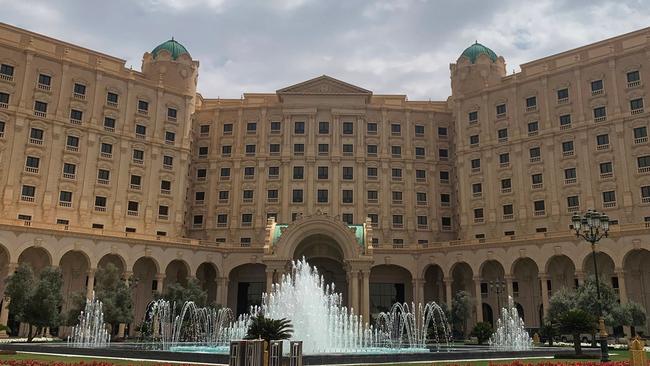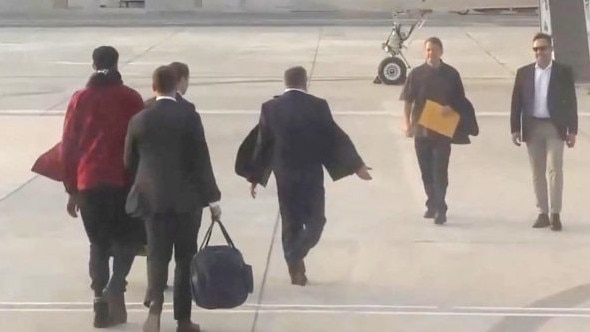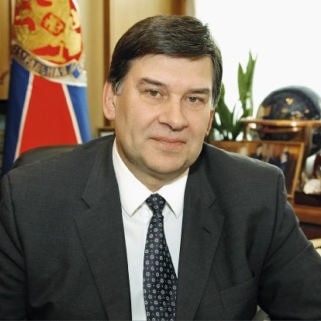Putin’s secret deal-maker emerges from the shadows
Sergei Beseda, who joined the KGB in the 1970s shortly after Putin, is one of the few Russian officials with a direct line to the President. Little is known about him in the West – but an investigation reveals he has played an instrumental role in some of Russia’s most sensitive missions.
The Riyadh Ritz-Carlton was under lockdown last month and Russia-US talks over the fate of Ukraine were entering their 13th hour when two wooden doors flung open to reveal the reclusive spy general helping lead the Kremlin’s negotiations.
Colonel General Sergei Beseda marched forward until he saw cameras flashing, then shuffled awkwardly and offered a tight smile. One of Russia’s most powerful spies, rarely photographed and yet for decades chosen to lead Vladimir Putin’s most sensitive operations, had become a public figure.
At this time last year, the career spy known to the CIA as “the Baron” was engaged in the kind of hyper-secretive business that had consumed most of his career – meeting the agency’s officials every few weeks in hotels booked under false names to negotiate the largest prisoner swap in US-Russian history. That exchange, conducted August 1, freed 24 prisoners including Wall Street Journal reporter Evan Gershkovich.
At the time, the Biden administration warned the Journal that the mere public mention of Beseda’s name could blow up one of Washington’s only remaining backchannels with the Kremlin at a time of war – and harm talks to free Americans.
This year, the 70-year-old veteran intelligence chief is very publicly back in those same hotels to handle peace negotiations with the Trump administration over Ukraine, which could potentially herald a tectonic realignment of the US toward Russia. Special envoy Steve Witkoff arrived in Moscow on Friday to attempt to advance the talks directly with Putin.
Beseda’s appointment shows how Putin’s spy services are supplanting the foreign ministry at high-level international negotiations – something security analysts say has never happened, even during the height of the Cold War.
Intelligence officials and diplomats who have sat opposite him say the involvement of Beseda – who helped plan the invasion of Ukraine – represents a message to Kyiv that Putin remains committed to gaining political control over Ukraine, these people said. That is an objective neither Ukraine nor most European capitals say they can accept.
Kyiv has accused Beseda of leading a campaign to undermine its efforts to break free of the Kremlin, saying that ahead of the war in Ukraine, Beseda’s Federal Security Service, or FSB, office ran polling data from Ukraine meant to encourage the Kremlin’s plans for invasion. Years before that, during Kyiv’s 2014 ouster of a pro-Russian president, former senior Ukrainian officials say he was involved in an operation that culminated in dozens of pro-Western protesters being gunned down by police. The Kremlin said he was only there to protect the Russian embassy.
When Lieutenant General Kyrylo Budanov, chief of Ukraine’s Defence Intelligence Agency, was asked in a 2023 interview with Ukrainska Pravda which Russian was most dangerous, he first declined to answer, then named Beseda. “He has done a lot of evil for Ukraine,” he said.
To profile the spymaster-turned-Putin’s negotiator, the Journal spoke to Russian, American, European and Middle Eastern current and former diplomatic and intelligence officials who worked with him over three decades, and reviewed flight manifests to identify Russian negotiating teams and unpublished photos of Beseda at clandestine talks he led.
Beseda, who joined the KGB in the 1970s shortly after Putin, is one of the few Russian officials with a direct line to the president. Little is known about him in the West beyond intelligence analysts and Kremlinologists, but a Journal investigation reveals he has played an instrumental role in some of Russia’s most sensitive missions.
When Slovenia jailed two Russian sleeper agents posing as ordinary Argentines, he flew to neighbouring Serbia to press an issue personally important to Putin. Speaking in a mix of makeshift Italian and the Spanish he learned to fluency while serving in Fidel Castro’s Cuba, he pushed the country’s spy chief to look after both the imprisoned couple and their elementary school-aged children, who were then housed in a spacious villa and allowed daily videocalls to their mom.
In contrast to the previous round of the U.S.-Russia peace talks in Riyadh, there were no news cameras inside the hotel when Beseda was present. No comments were given until the next day, when the Russians unexpectedly demanded sanctions relief. Until then, the statement said, they wouldn’t comply with a Black Sea ceasefire, which had been at the centre of discussions.
The Central Intelligence Agency, Federal Bureau of Investigation and White House declined to comment.
Neither the Kremlin nor the FSB responded to a request for comment.

The palatial hotel setting for talks, its hallways richly inlaid with stone mosaics, served as an ominous backdrop in 2017 when Saudi Crown Prince Mohammed bin Salman cleared out the guests and locked up hundreds of princes, ministers and business people he accused of corruption. It was in the same city where Beseda negotiated the final details of the August exchange with a CIA delegation led by Deputy Director of Operations Tom Sylvester and a delegation of Germany’s BND intelligence agency. Those talks cemented the so-called “big list” of prisoners who would be swapped on a cordoned off section of Ankara’s Esenboga airport.
Beseda was a warm and witty presence, a contrast to the stuffy FSB apparatchiks. He cracked jokes and, at their first meeting, brought gifts for his CIA counterparts: Soviet history-themed mementos. The CIA offered him a bottle of bourbon.
‘The Baron’
During the Biden administration, when the Kremlin’s invasion of Ukraine left diplomatic contacts between Washington and Moscow at their worst point since the Cuban missile crisis, both countries depended on their intelligence agencies to maintain contact. Beseda was one of the select few Russian officials allowed to communicate with the U.S. In the vacuum, both countries depended on their intelligence agencies to maintain contacts, sometimes delegated to meet with then-CIA Director William Burns.
Beseda was a charismatic presence at an annual Moscow New Year’s party known as the “Spy Ball” during a period of warmer relations in the early Obama years. Vodka flowed freely at the FSB affair, where officials from the CIA and FBI would mingle awkwardly with spies from Cuba, Iran and North Korea, among others.
“All kinds of characters from all over the world,” said a former US ambassador to Moscow, Michael McFaul. “We felt like a fish out of water.”
His CIA nickname, the Baron, comes from his love of custom tailoring and a cigar habit that hints at his time in Havana. “Col. Gen. Beseda was designated by the Kremlin to negotiate on prisoner exchanges,” said one former U.S. official who has negotiated with him. “These cases are controlled down to the smallest detail by the FSB.” His undisclosed meetings with the CIA took place in hotel conference rooms, with no phones allowed, across Europe and the Middle East. The negotiations led in 2022 to the exchange of two Americans imprisoned in Russia – basketball gold medallist Brittney Griner and former Marine Trevor Reed – for arms trader Viktor Bout and drug smuggler Konstantin Yaroshenko.

But those two Americans were convicted of ordinary criminal offences. It was harder to make progress in the cases of Gershkovich and former Marine Paul Whelan, who were both accused of espionage, which they, their families and the U.S. government all denied. In these cases, Beseda took a hard line, initially insisting that the U.S. trade accused spy for spy.
Keeping tabs on US spies
There are only a few publicly available photos of Beseda. In one, he is sitting stone-faced in his office next to a bank of white Vertushka phones, the dialless type of landline the Soviet bureaucracy used to securely reach the Kremlin. The FSB’s website doesn’t list him among its leadership.
He has almost never spoken to the media, with the exception of a 2012 interview with the FSB’s in-house magazine, when he talked about Russia’s need to strengthen co-operation with foreign intelligence agencies. “Every sane person understands that you can’t survive in this world alone,” he said.
His star began to rise with another backchannel some 40 years ago: As a young officer in the 1980s, Beseda worked in the KGB Second Directorate’s “American Section,” tasked to keep tabs on US intelligence officers in Moscow, which opened a secret line of communication to the CIA.

One US official who met Beseda at the Lubyanka headquarters described him as a “barbarian handler,” who the Americans could call on, to lobby him to reel in the FSB’s most overzealous officers.
Beseda has since last year been an adviser to FSB Director Alexander Bortnikov. Before that he ran the Fifth Service, which oversees the agency’s communications with foreign partners and US agencies. It includes the Department of Operative Information, the FSB’s foreign intelligence branch, which US and former Russian security officials say led the planning of Putin’s invasion of Ukraine.
According to Russian investigative website Agentura, Beseda once worked with the secretive DKRO unit of counterintelligence that the Journal revealed was behind the arrest of Gershkovich and other Americans. He moved to the department overseeing the presidential administration after Putin became Russia’s leader, according to Agentura.
He is one of a handful of Russian officials who can directly reach Russia’s president — the sole decision maker. Russia’s foreign minister, Sergei Lavrov, and his deputy, Sergei Ryabkov, were largely sidelined from prisoner discussions.
‘I can find out everything’
The backchannel for prisoner talks was crystallised at the June 2021 summit between Biden and Putin at an 18th century lakeside villa in Geneva.
Biden tapped the U.S. ambassador to Moscow, John Sullivan, as the American go-between, while Beseda got the nod on the Russian side. At their first meeting in Russia’s foreign ministry, Sullivan realised his host was performatively gazing at his watch. Suddenly Beseda rose from the table and left, joking that he wouldn’t need to be briefed on the remainder of the meeting. “I’m FSB,” he said, using his agency’s Russian acronym. ”I can find out everything.”
Days later, a message landed at the White House: If Washington and Moscow wanted to explore prisoner trades, the Kremlin would insist that the conversations flow through intelligence agencies, as they had during the Cold War.
The U.S. accepted and the first meeting was pleasant, but inconclusive. The FBI wasn’t interested in releasing Russian prisoners, extradited to the U.S. and convicted of serious crimes in U.S. courts.
The two sides later met again, and as the CIA took the reins, moved toward a deal to swap Reed, the former U.S. Marine jailed for nine years on assault charges he and the U.S. government said were trumped up, for Yaroshenko, the convicted Russian drug smuggler. The exchange was set for April 27, 2022, at Turkey’s Ankara airport. The details were hammered out in a flurry of papers passed between the CIA and Beseda’s subordinates.
The CIA was unsure if Beseda was still in charge. The general, an investigation by Russian intelligence specialist Andrei Soldatov reported, had fallen out with Putin after his invasion of Ukraine failed to topple its government and been sent to Lefortovo prison, the same notorious jail for political prisoners where Gershkovich and other US detainees have been held. Some US officials worried the prisoner-exchange channel would collapse.
But when US officials some days later walked into a bilateral meeting in Moscow, Beseda sat smiling behind a conference table, welcoming them with a joke that paraphrased Mark Twain: “Rumors of my demise,” the general said, “are greatly exaggerated.”
The Wall Street Journal



To join the conversation, please log in. Don't have an account? Register
Join the conversation, you are commenting as Logout